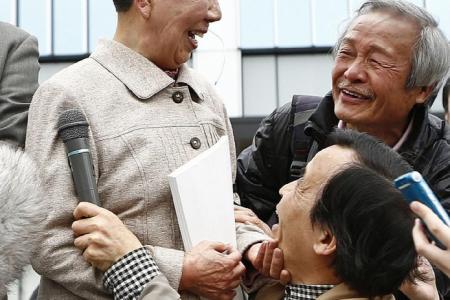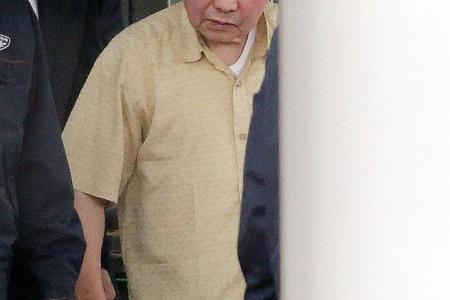Death row inmate walks free after 47years
A man believed to be the world's longest-serving death row inmate was yesterday granted a retrial in Japan over multiple murders in 1966, decades after doubts emerged about his guilt.
Shizuoka District Court decided to "start the retrial over the case" of Iwao Hakamada, 78, who was convicted for the murder of his boss and family.
Presiding judge Hiroaki Murayama cited possible planting of evidence by investigators to win a conviction as they sought to bring closure to a crime that shocked the country.
He said "there is possibility that (key pieces of) evidence have been fabricated by investigative bodies", reported Jiji Press.
The judge also ordered Hakamada's release, saying continued confinement "goes against justice". He walked free from jail yesterday.
Apart from the United States, Japan is the only major industrialised democracy to carry out capital punishment.
Hakamada is the sixth person since the end of World War II to receive a retrial after having a death sentence confirmed, and his case will bolster opponents of capital punishment, including rights group Amnesty, which has just launched its annual report on the practice.
CAMPAIGNED
Hakamada's sister Hideko, 81, who has campaigned for a retrial for decades, thanked supporters who gathered in front of the court house.
"I want to free him as soon as possible," she told a press conference held shortly after the court announced its decision. "I want to tell him, 'You did well. You will finally be free'."
Hakamada seems to have developed psychological illnesses after decades in solitary confinement, Ms Hideko told AFP in an interview last year.
"What I am worried about most is Iwao's health. If you put someone in jail for 47 years, it's too much to expect them to stay sane," she said.
Amnesty, which has championed Hakamada's cause and says he is the world's longest-serving death row detainee, called on prosecutors to respect the court's decision.
"It would be callous and unfair of prosecutors to appeal the court's decision," said Ms Roseann Rife, the organisation's East Asia research director.
"Time is running out for Hakamada to receive the fair trial he was denied more than four decades ago."
Shizuoka prosecutors told Japanese media that they are undecided on whether to appeal the decision, according to national broadcaster NHK.
Hakamada initially denied accusations that he robbed and killed his boss, the man's wife and two children before setting their house ablaze.
But the former boxer, who worked for a bean paste maker, later confessed after what he subsequently claimed was a brutal police interrogation that included beatings.
But the now-frail Hakamada remained in solitary confinement on death row.
His supporters and some lawyers, including the Japan Federation of Bar Associations, have loudly voiced their doubts about evidence, the police investigations and the judicial logic that led to the conviction.
Even one of the judges who originally sentenced Hakamada to death in 1968 has said he was never convinced of the man's guilt, but could not sway his judicial colleagues, who out-voted him.
Get The New Paper on your phone with the free TNP app. Download from the Apple App Store or Google Play Store now


